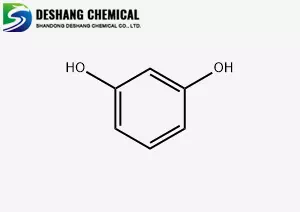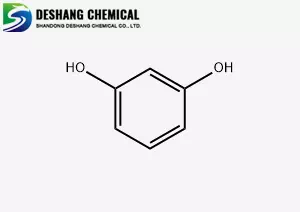What is resorcinol CAS 108-46-3?
Resorcinol is commonly known as "resorcinol". This product has the functions of killing bacteria, mold and relieving itching. Its bactericidal effect is one third of that of phenol, and its irritability and corrosiveness are also relatively small. Low concentrations have the effect of promoting the regeneration of keratin, while high concentrations have the effect of keratin exfoliation.
A concentration of 1% to 2% has antiseptic, bactericidal, antifungal, astringent, anti-itch and keratinizing effects. A concentration of 5% to 20% has keratinizing dissolution effects, which can cause the stratum corneum to peel off. A concentration of 40% has corrosive effects. It can be absorbed through the skin or ulcer surface.
resorcinol CAS 108-46-3 Use
resorcinol, also known as 1, 3-hydroquinone, is commonly called resorcinol. It is used in the synthesis of 3-chloro-4-methylcoumarin, an intermediate for the insecticide flyphosate, and the herbicide ethofluron in pesticides. It can also be used in the manufacture of various dyes, special coatings, pharmaceuticals, photosensitive materials, synthetic resins, adhesives, cosmetics, etc.
It is used in the photosensitive film, pharmaceutical, dye and chemical fiber industries
Used as an analytical reagent
Resorcinol is mainly used in rubber adhesives, synthetic resins, dyes, preservatives, pharmaceuticals and analytical reagents, etc. Resorcinol is similar to phenol and cresol, and can form condensation polymers with formaldehyde. It can be used to make adhesive threads and tire cord adhesives for nylon, prepare wood adhesives, and bond vinyl materials with metals. Resorcinol is an intermediate for many azo dyes and fur dyes, and also a raw material for the pharmaceutical intermediate p-nitrosalicylic acid. Resorcinol has a bactericidal effect and can be used as a preservative, added to cosmetics, skin disease drug pastes and ointments, etc. The derivative of resorcinol, β -methylumbellidone, is an intermediate for optical bleaching agents, trinitroresorcinol is a detonator for detonators, and a considerable amount of resorcinol is used in the production of benzophenone ultraviolet absorbers. This product can irritate the skin and mucous membranes and may be rapidly absorbed through the skin, causing poisoning symptoms. The minimum lethal dose for subcutaneous injection in rats is 450mg/kg.
Reagents for the verification and colorimetric determination of zinc, lead, tartaric acid, nitrate and nitrite, colorimetric determination of furfural alcohol and sugar, testing of ketosugar and lignin, diazo compound salt reagents, organic synthesis.
resorcinol CAS 108-46-3 safety
Toxicity classification
Highly toxic
Acute toxicity
Oral administration - Rat LD50: 301 mg/kg; Oral administration - Mouse LD50: 200 mg/kg
Stimulus data
Skin - Rabbit 20 mg /24 hours moderate; Eyes - Rabbit 100 mg severe
Hazardous characteristics of explosives
It is explosive when mixed with air
Flammable hazardous characteristics
Flammable; Combustion produces toxic chlorides that irritate smoke
Storage and transportation characteristics
The warehouse is well-ventilated, low-temperature and dry. Store separately from oxidants
Service
* Prompt reply and 24 hours online, professional team to provide best price and high quality product.
* Sample testing support.
* Every batch of products will be tested to ensureits quality.
*The packing also can be according the customers` requirment.
*Any inquiries will be replied within 24 hours.
*we provide Commerical Invoice, Packing List, Bill of loading, COA , Health certificate and Origin certificate. If your markets have any special requirements, let us know.







